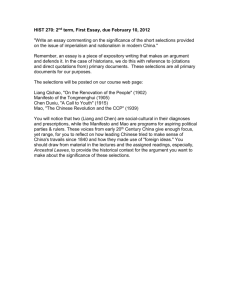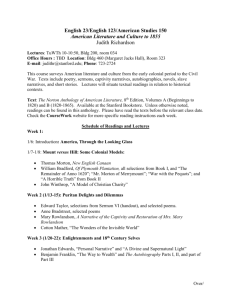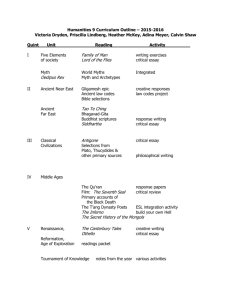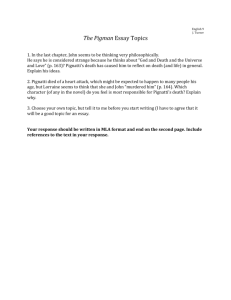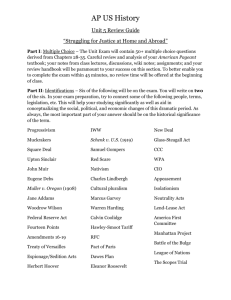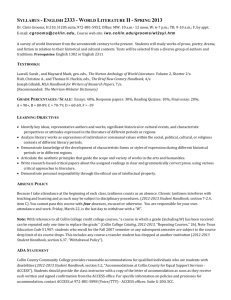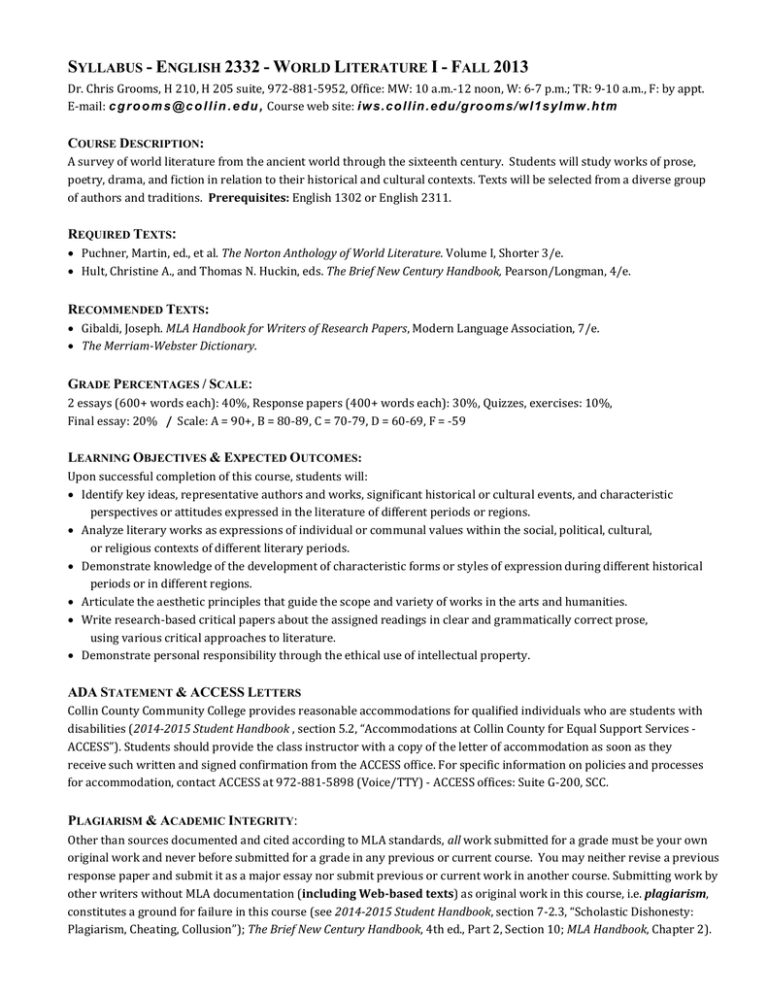
SYLLABUS - ENGLISH 2332 - WORLD LITERATURE I - FALL 2013
Dr. Chris Grooms, H 210, H 205 suite, 972-881-5952, Office: MW: 10 a.m.-12 noon, W: 6-7 p.m.; TR: 9-10 a.m., F: by appt.
E-mail: c g r o o m s @ c o l l i n . e d u , Course web site: iw s.collin .edu/grooms/w l1syl m w .htm
COURSE DESCRIPTION:
A survey of world literature from the ancient world through the sixteenth century. Students will study works of prose,
poetry, drama, and fiction in relation to their historical and cultural contexts. Texts will be selected from a diverse group
of authors and traditions. Prerequisites: English 1302 or English 2311.
REQUIRED TEXTS:
Puchner, Martin, ed., et al. The Norton Anthology of World Literature. Volume I, Shorter 3/e.
Hult, Christine A., and Thomas N. Huckin, eds. The Brief New Century Handbook, Pearson/Longman, 4/e.
RECOMMENDED TEXTS:
Gibaldi, Joseph. MLA Handbook for Writers of Research Papers, Modern Language Association, 7/e.
The Merriam-Webster Dictionary.
GRADE PERCENTAGES / SCALE:
2 essays (600+ words each): 40%, Response papers (400+ words each): 30%, Quizzes, exercises: 10%,
Final essay: 20% / Scale: A = 90+, B = 80-89, C = 70-79, D = 60-69, F = -59
LEARNING OBJECTIVES & EXPECTED OUTCOMES:
Upon successful completion of this course, students will:
Identify key ideas, representative authors and works, significant historical or cultural events, and characteristic
perspectives or attitudes expressed in the literature of different periods or regions.
Analyze literary works as expressions of individual or communal values within the social, political, cultural,
or religious contexts of different literary periods.
Demonstrate knowledge of the development of characteristic forms or styles of expression during different historical
periods or in different regions.
Articulate the aesthetic principles that guide the scope and variety of works in the arts and humanities.
Write research-based critical papers about the assigned readings in clear and grammatically correct prose,
using various critical approaches to literature.
Demonstrate personal responsibility through the ethical use of intellectual property.
ADA STATEMENT & ACCESS LETTERS
Collin County Community College provides reasonable accommodations for qualified individuals who are students with
disabilities (2014-2015 Student Handbook , section 5.2, “Accommodations at Collin County for Equal Support Services ACCESS”). Students should provide the class instructor with a copy of the letter of accommodation as soon as they
receive such written and signed confirmation from the ACCESS office. For specific information on policies and processes
for accommodation, contact ACCESS at 972-881-5898 (Voice/TTY) - ACCESS offices: Suite G-200, SCC.
PLAGIARISM & ACADEMIC INTEGRITY:
Other than sources documented and cited according to MLA standards, all work submitted for a grade must be your own
original work and never before submitted for a grade in any previous or current course. You may neither revise a previous
response paper and submit it as a major essay nor submit previous or current work in another course. Submitting work by
other writers without MLA documentation (including Web-based texts) as original work in this course, i.e. plagiarism,
constitutes a ground for failure in this course (see 2014-2015 Student Handbook, section 7-2.3, “Scholastic Dishonesty:
Plagiarism, Cheating, Collusion”); The Brief New Century Handbook, 4th ed., Part 2, Section 10; MLA Handbook, Chapter 2).
LATE WORK & COURSE COMPLETION:
Late work prohibits your progress in the course and presents a very uneven picture of your communication skills.
Submitting late response papers or essays constitutes the loss of one full letter grade (10 points) for the first class day that
the submission is late. I will not accept late submissions beyond that date. As all due work must be submitted to the
instructor at the end of class, a student must be in attendance for the full class in order to submit work. I do not accept
e-mail, office, or class drop-off submissions. Any work submitted without parenthetical MLA documentation and a word
count at the end will be returned to the student with a grace period of one week for resubmission with a penalty of a full
letter grade (10 points). You must submit all major essays in order to pass the course.
ABSENCES & TARDINESS
Because I take attendance at the beginning of each class, tardiness counts as an absence. Chronic tardiness interferes
with teaching and learning and as such may be subject to disciplinary procedures. (2014-2015 Student Handbook, section
7-2.4, item C). You cannot pass this course with five absences, excused or otherwise. You are responsible for your own
attendance and work. Friday, October 18, is the last day to withdraw from the course with a “W”.
Note: With reference to all Collin College credit college courses, “a course in which a grade (including W) has been
received can be repeated only one time to replace the grade.” (Collin College Catalog, 2014-2015, “Repeating Courses,”
26). Note Texas Education Code 51.907: students who enroll in any subsequent semester to Fall 2007 are subject to the
course drop limit of six course drops. This includes any course a transfer student has dropped at another institution
(2014-2015 Student Handbook, section 6.37, “Withdrawal Policy”).
READING QUIZZES
I give reading quizzes at the beginning of class on calendar dates with selected readings – no makeup quizzes.
PORTABLE PHONES & COMPUTERS
Please turn off and store all portable phones and/or laptop computers with Web access during class time. If you need to
monitor any outside communication for emergency purposes during a specific class, please set your phone on vibrate and
inform the instructor before class begins. It is an academic offence to engage “in the use of media and telecommunication
devices during class” (2014-2015 Student Handbook, section 7.2-4, item S, “Student Code of Conduct,”; “Academic Etiquette
and the College Experience,” section 6.1).
COURSE WEB SITE: iws.collin.edu/grooms/wl1syl mw.htm
Left Menu: Syllabus (Course Policies and Textbooks) and Revision Guidelines
Right Menu: Weekly Calendar of Readings, Essays and Response Paper Assignments
CALENDAR - ENGLISH 2332 - WORLD LITERATURE I - FALL 2013
Please complete the following readings (introductions, biographies, timelines, and works) by the calendar date.
WEEK: (DAY)
AUGUST
1: (26) Introduction to the Course
(28) Writing Sample / Revision Guidelines Survey.
SEPTEMBER
ORIGINS OF LANGUAGE
2: (4)
“Preface,” xix-xxv; “The Invention of Writing and the Earliest Literatures,” 1-6.
THE HEBREW BIBLE (ca. 1000–300 B.C.E.), 89-94; Genesis, Chapter 11 [The Tower of Babel], 103.
THE CHRISTIAN BIBLE: THE NEW TESTAMENT GOSPELS (ca. first century C.E.), 816-18;
John I [The Word], 830-31.
CREATION TALES
3: (9)
THE BAYLONIAN CREATION EPIC (ENUMA ELISH), 21; from Tablet I, V, VI, VII, 22-26.
POPOL VUH (transcribed 1554-58), 1905-06; From Part 1, [Prologue, Creation], 1906-09;
From Part 4, [Origin of Humanity, First Dawn], 1916-19.
(11) THE HEBREW BIBLE (ca. 1000–300 B.C.E.), 89-94;
Genesis, Chapters 1–4 [From Creation to the Murder of Abel], 94-98.
THE FLOOD
4: (16) THE EPIC OF GILGAMESH (ca. 1900–250 B.C.E.), 33-37, Tablet XI, 80-88.
(18) THE HEBREW BIBLE (ca. 1000–300 B.C.E.), 89-94; Chapters 6–9 [Noah and the Flood], 99-102.
THE UNDERWORLD
5: (23) THE EPIC OF GILGAMESH (ca. 1900–250 B.C.E.), 33-37; Tablet IX-X, 72-80.
HOMER (eigth century B.C.E.), 121-29; The Odyssey, Book XI, 296-312.
(25) DANTE ALIGHIERI (1265–1321), 1049-53; The Divine Comedy: Inferno, Cantos I-III, 1049-63.
THE EPIC
6: (30) THE EPIC OF GILGAMESH (ca. 1900–250 B.C.E.), 33-37; Tablet I-II, 38-50.
VIRGIL (70–19 B.C.E.), 573-77; The Aeneid, Book 1 [Safe Haven after Storm], lines 1-41, 577-78.
OCTOBER
(2)
BEOWULF (ninth century), 885-89; Prologue, lines 1-85, 891-92.
SUNJATA: A WEST AFRICAN EPIC OF THE MANDE PEOPLES (late thirteenth–early fourteenth century),
1514-17; The Search for a Wife of Destiny, lines 1-33.
TAO QIAN (365–427), 1291-92; The Peach Blossom Spring, 1293-94.
OCTOBER (CONT.)
THE ROMANCE
7: (7)
MARIE DE FRANCE (1150?–1200?), 1029-30;
From Lais: Prologue, Lanval, Laüstic (The Nightingale), 1031-48.
(9)
THE THOUSAND AND ONE NIGHTS (ALF LAYLA WA-LAYLA) (fourteenth century), 1173-76;
all selections, 1176-97.
HUMAN LOVE
8: (14)
EGYPTIAN LOVE POEMS (ca. 1300-1100 B.C.E), 26-28.
[I wish I were her Nubian maid], 30-31; [I passed close by his house, Sixth Stanza], 31-32;
[Seven whole days], 32; [Am I not here with you?], 32-33.
SAPPHO (born ca. 630 B.C.E.), 467-69.
Fragment 48 [You came and I was crazy for you], 472; Fragment 51 [I don’t know what to do], 472;
Fragment 55 [Dead you will lie], 472-73; Poem 94 [I simply want to be dead], 473.
CATULLUS (ca. 84–ca. 54 B.C.E.), Poems , 2, 567-68; 5, 568; 7, 569; 16, 570; 70, 571.
Essay One due (Weeks 2-7).
(16) THREE WOMEN POETS (fifth–eighth centuries?), “India’s Classical Age,” 1251-59.
Vikatanitamba, 1262; 572 [As he came to bed the knot fell open of itself], 1262-63.
Bhavakadevı, 1263; 646 [At first our bodies knew a perfect oneness], 1263.
Vidya, 1263-64; 807 [Good neighbor wife, I beg you], 1263-64.
DHARMAKIRTI (early seventh century), 1264; 477 [Your union with your lover will be very brief], 1265.
BHAVABHUTI (eighth century), 1265-66; 598 [And as we talked together softly, secretly], 1266;
783 [My love is married to me], 1266.
MIRABAI (sixteenth century), “Indian Poetry after Islam,” 1585-86, 1595; [Darling, come visit me], 1599;
[My lord who lifts mountains], 1600.
Last day to withdraw from classes with a ‘W’: Friday, October 18
LOVE AND NATURE
9: (21) THE CLASSIC OF POETRY (ca. 1000–600 B.C.E.), 756-59; VI. Peach Tree Soft and Tender, 760;
XX. Plums Are Falling, 760; XXIII. Dead Roe Deer, 761; XXVI. Boat of Cypress, 761; XLII. Gentle Girl, 762.
RĀJAŚEKHARA (late ninth–early tenth century), 1270-71; all selections, 1271.
FRANCIS PETRARCH (1304–1347), 1618-20; Sonnets, 3, 1621 [It was the day...].
(23)
THE MAN’YŌSHŪ (COLLECTION OF MYRIAD LEAVES) (ca. 759), 1354-58;
Kakinomoto no Hitomaro, Poem composed by Kakinomoto no Hitomaro, sorely grieving..., 1360-61.
THE KOKINSHŪ (ca. 905), 1366-67; Ki no Tsurayuki, From The Japanese Preface, 1368-71;
From Book 11. Love, all selections, 1375-77.
OCTOBER (CONT.)
SPIRIT AND NATURE
10: (28) THE HEBREW BIBLE (ca. 1000–300 B.C.E.), 89-94; Psalm 104, 119-20.
THE QUR’AN (610–632), 858-61; [Sura] 55. The Lord of Mercy, 883-884.
(30) YOGEŚVARA (ninth century), 1267; all selections, 1267-68.
MURĀRĪ (mid-ninth century), 1268-69; all selections, 1269-70.
WANG WEI (ca. 699–761), 1308-09; From Wang River Collection, all selections, 1309-10.
LI BO (701–762), 1311-12; all selections, 1312-15.
THE KOKINSHŪ (ca. 905), 1366-67; Book 1. Spring, Book 2. Spring, Book 6. Autumn, 1372-75.
NOVEMBER
LESSONS IN LIVING
11: (4)
SAPPHO (born ca. 630 B.C.E.), 467-69; The New Sappho, 474.
BHARTṚHARI (fifth century), 1259; all selections, 1260-62.
DHARMAKIRTI (early-7th century), 1264; [poem] 1213, Never to ask..., 1265.
BHAVABHŪTĪ (eighth century), 1265-66; 1731 [The people in this world who scorn me], 1266-67.
Essay Two due (Weeks 8-10).
(6)
TAO QIAN (365–427), 1291-92; Elegy, 1302-03;
DU FU (712–770), 1316; Spring Prospect, 1317; Thoughts While Travelling at Night, 1320.
TUKARAM (1608–1649), 1601; The Rich Farmer, 1602.
POPOL VUH, From Part III, poem, “Their ancient day...,” 1916.
SPIRITUAL STATES / EAST
12: (11) THE BHAGAVAD-GITA (fourth century B.C.E.– fourth century C.E.), 726-29; all selections, 729-45.
CONFUCIUS (551–479 B.C.E.), 766-70; From Analects, 770-80.
(13) DAODEJING/LAOZI (sixth–third centuries), 781-82; all selections, 782-90.
TAO QIAN (365–427), 1291-92; Substance, Shadow, and Spirit, 1297-98.
SPIRITUAL STATES / WEST
13: (18) THE CHRISTIAN BIBLE: THE NEW TESTAMENT GOSPELS (ca. first century C.E.), 816-18;
Matthew 5–7 [The Sermon on the Mount], 821-24;
From Matthew 13 [Why Jesus Teaches in Parables]. 825-27.
(20) THE QUR’AN (610–632), 858-61; [Sura] 5. The Feast, 861-69.
14: (25) KABIR (ca. 1398–1448), 1586; The Final State, 1587; Mosque with Ten Doors, 1588-89; Purity, 1589-90;
The Simple State, 1591-93; Aphorisms, 1593-94.
(27) Thanksgiving Holiday: November 27- December 1– all campuses closed.
DECEMBER
THE NATURE OF POWER
15:
(2) NICCOLÒ MACHIAVELLI (1469–1527), From The Prince, 1629-37.
(4) Preparation for the final essay – thesis workshop.
16:
(9) Final Essay (Weeks 12-15): in-class, Monday, December 9, 2:30 p.m. - 4:30 p.m.
READING THE NORTON ANTHOLOGY OF WORLD LITERATURE, SHORTER 3/E.
Please follow these ordered instructions for the most effective use of your academic energies:
1. Read carefully the introduction to each period and author before reading the primary work. These detailed
discussions and biographies provide an intellectual blueprint for your personal understanding and analysis. As much
of the literature in this course originates from languages and cultures both ancient and distant from your own,
internalizing the material in these period and author introductions will ease the initial anxiety and ego-shock at
exploring new forms of literature.
2.
Read the 'Response Paper' and ‘Essay’ assignments (posted on the course web site) for each literary selection before
beginning reading. This strategy will allow you to search for key ideas and support examples with which to support
your written responses. With the response paper and essay prompts in mind, develop a simple note system (pencil,
pen, page point, post-it tabs, highlighter, etc.) to mark any support examples that may be relevant to response paper
prompts.
3.
As you read a specific work, always stop and review the footnotes for each word or idea. Although these notes may
appear to slow you down, they actually generate a quicker cumulative understanding of the work, thus providing you
with a greater confidence when you write. The great advantage and design of the Norton Anthology is the immediate
access to notes and explanations at the bottom of each page.
4.
Always have a reference dictionary (such as the recommended Merriam-Webster in the textbook list) for looking up
new words. Although most of the texts are translations, the vocabulary of each translator is rich and complex. As
translations are attempts to realize more fully the original sound and sense of each work, translators explore the full
range of the English language in order to heighten your comprehension and reading pleasure. The Oxford Dictionary
of the English Language ( the OED ) is also available through your CougarWeb account access to our library databases.
If you find a particular period or author interesting or engaging, you may always pursue a larger reading plan for future
intellectual growth and pleasure by purchasing the primary work from which the Norton Anthology draws its resources.
Please note that each work links a specific text available from either Amazon or Barnes & Noble bookseller web sites.

